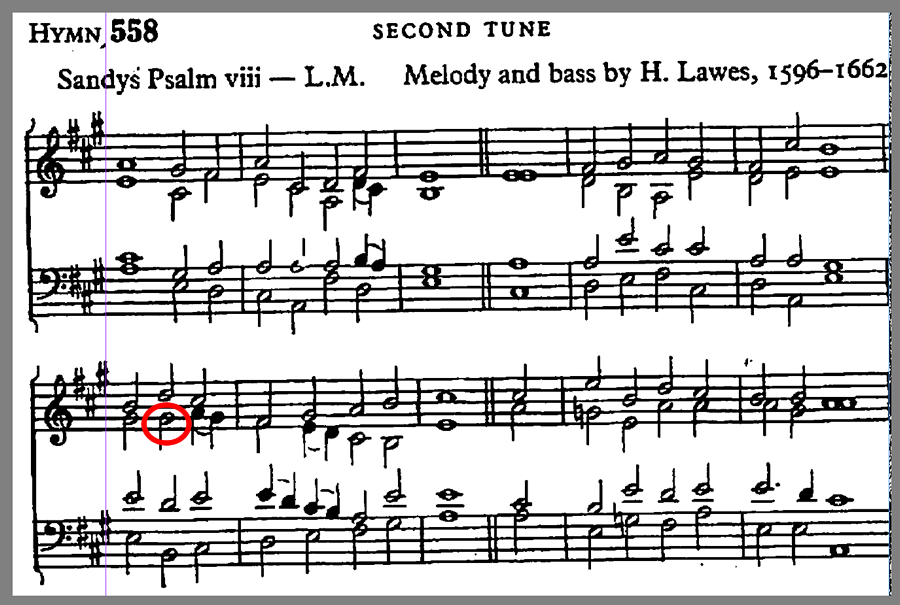Error in Sandys Psalm viii - Hymn Tune L.M.
-
Friends,
Surely that G-sharp ought to be an F-sharp, correct?
-
I find nothing particularly objectionable in the G-sharp — tritones were not unheard of in the seventeenth century (and this is just a diminished chord extracted from the dominant seventh). Indeed, in the arrangements Psalmody for a single voice... by William Carridge, this is presented as a first inversion dominant seventh chord (the bass line B and subsequent C-sharp replaced by G-sharp and A, respectively).
Changing it to an F-sharp (in the resulting B minor chord) softens the feeling of the accented syllable and, while perhaps acceptable, isn't quite as harmonically strong as leaving the G-sharp as it stands.
Are there any other sources for this tune and harmonization?Thanked by 1PMulholland -
An F# would produce similar-motion fifth with the B in the Bass. Not parallel, but still frowned upon by some theorists.
Also, I was taught that tritones tend to resolve inward. If that's true, the move to A-C# in the next chord supports the idea that the G# is intentional.Thanked by 1PMulholland -
I agree completely, Adam. For those who don't have a keyboard handy, I'm attaching an MP3 of this harmonization. The more I listen to it, the more I like it!

 Sandy's Psalm 8.mp32MThanked by 1Adam Wood
Sandy's Psalm 8.mp32MThanked by 1Adam Wood
Welcome to the MusicaSacra Forum!
To participate in the discussions on Catholic church music, sign in or register as a forum member, The forum is a project of the Church Music Association of America.
Categories
- All Discussions21,281
- General Music Discussion8,297
- Job Openings216
- Management of Music Programs852
- Choral Matters534
- Church Documents and Rubrics528
- CMAA Notes304
- Events730
- For Newcomers: Read First26
- Sacred Polyphony550
- Hymnody875
- Gregorian Chant: General2,711
- ↳ Graduale Romanum and Liber Usualis370
- ↳ Graduale Simplex60
- ↳ Semiology63
- Vernacular Plainsong698
- Anglican Use and Anglican Chant68
- Organ, Other Instruments and Repertoire438
- New Composition/Works in Progress1,302
- Recordings234
- Music for Hispanic Ministry162
- Music Education: Children213
- Music Education: General222
- News Items245
- Positions Wanted3
- General Discussion: Catholicism740
- Amusements177
- General Discussion1,037
- Opinions119



